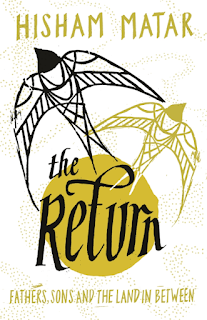
I love the end of the year, because it gives me a chance to read all the “Best of the year” lists and thereby find new books. THE RETURN was on many of 2016’s lists, and it is indeed a fine book. It’s the true account of a family’s twenty five year search for their father, who was disappeared by the Gaddafi regime. He was abducted in Cairo, with the active connivance of the Mubarak regime, and for some time his family thought he would soon be back – his wife recorded football matches for him for months – but in fact he never returned; or, at least, he has not so far.
The story is in many ways deeply familiar, the terrible story of the disappeared all over the world, but’s it beautifully and honestly told here:
When your father has been made to disappear for nineteen years, your desire to find him is equalled by your fear of finding him. You are the scene of a shameful private battle
I learnt a great deal about Libya while reading this book. While I knew Gaddafi was a monstrous dictator, of course, I did not realise that he was also crazy – like Idi Amin levels of crazy. Apparently there was a rumour of a prison actually underneath his compound in Tripoli, which most people did not believe. After the revolution, they found there was indeed a prison, buried deep underground, for his most notable opponents – “both the living and the dead. Freezers were discovered there with the bodies of long deceased dissidents.”
He also enjoyed darkly comic dictator behaviour. For example, once he set a trap: He “invited young literary talent to take part in a book festival, then arrested them.” He held most of them for ten years. I still find it hilarious that among Gaddafi’s last words to the soldiers who found him in the culvert (after some no doubt enjoyable begging for mercy) was “What did I do to you?”
Matar describes himself as “infantilised by exile” as “if part of me had stopped developing the moment we left Libya,” and covers the back and forth of immigrant life very well:
Back in October 2011, I had considered never returning to Lydia. I was in New York, walking up Broadway, the air cold and swift, when the proposition presented itself. It seemed immaculate, a thought my mind had manufactured independently. As in youthful moments of drunkenness, I felt bold and invincible.. . . In the thirty years since we left Libya, my family and I had built associations with several surrogate cities: Nairobi, where we went on our escape from Libya, in 1979, and have continued to visit ever since; Cairo, where we settled into indefinite exile the following year; Rome, a vacation spot for us; London, where I went at the age of 15 for my studies and where for 29 years I have been doggedly trying to make a life for myself; Paris, where, fatigued and annoyed by London, I moved in my early thirties, vowing never to return to England, only to find myself back two years later. In all these cities, I had pictured myself one day calm and living in that faraway island, Manhattan, where I was born. I would imagine a new acquaintance asking me . . . that old tiresome question “where are you from?” And I, unfazed and free of the usual agitation, would casually reply, “New York”
. However he never quite manages this, because as he explains:
I am often unnerved by exiles I meet who, like me, have found themselves living in London but who, unlike me have surrendered to the place and therefore exude the sort of resigned stability I lack. Naked adoption of native mannerisms or the local dialect – this has always seemed to me a kind of humiliation.
The book focuses on Hisham’s return to Libya immediately after Gaddafi’s fall. There he is able to meet many old men, who have been released from various prisons as the regime has collapsed, and is able to see that his father is not among them. It is almost a relief:
For a quarter of a century now, hope has been seeping out of me. Now I can say, I am almost free of it. All that remains are a few scattered grains
.
Already sad, this book is made sadder by what has happened to Libya since his return – the brief hopeful period after Gaddafi’s fall has been followed by full civil war. Clearly this is a great book; it’s made me mourn a country I barely know.
